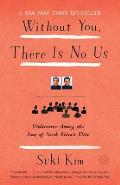Because so few Westerners are allowed into North Korea, very few people know much about what life is actually like in North Korea.
Suki Kim was born in South Korea, and her family emigrated to the U.S. when she was 13. She grew up with stories of family members who disappeared during and since the Korean conflict. These disappearances haunt her. She hopes to gain insight into what kind of world made this happen as she takes a position as a teacher in a school for elite young men in North Korea.

She's eager to learn about the country and its people, and at the same time she is terrified. Strict warnings were passed down about what she could and couldn't do, and what she could and couldn't say. They include...
"Never hint that there is anything wrong with their country.
"Living in Pyongyang is like living in a fishbowl. Everything you say and do will be watched. Even your dorm room might not be secure. They could go through your things. If you keep a journal and if you say something in it that is not complimentary, please do not leave it in your room. Even in your room, whatever you say could be recorded. Just get in a habit of not saying everything that is on your mind, not criticizing the government and things of that sort, so you won't slip.
"Do not make comparisons. For example, do not say that their food is different from yours because that could be construed as critical.
"Be careful with your terminology: Great Leader, Dear Leader, Precious Leader. Those names have to be carefully used, or better yet, just stay away from discussing them at all. Be careful about how to handle images too. For example, Air Koryo offers in-flight magazines. You take one to your office and it has a picture of Kim Jong-il, and let's say you end up sitting on it by mistake. Then you are in big trouble, because the photo is like the person. It is the same with the portrait of Kim Il-sung on the pins every North Korea wears. These men are regarded as deities, at least officially. Make sure you do not throw away, fold, tear, or damage any visual representation of them. Do not point at such images either. It would be considered an act of disrespect and you would be punished.
It is hard for us to imagine living under this kind of restriction and oppression. Kim, by living it herself, and dangerously taking notes to be able to write this book on her return to the U.S., unveils harsh political, social, and economic realities faced by North Korean citizens.
Illuminating. Definitely worth a read.
Thanks to librarything for their Early Reviewer program! Check out librarything.com! You can also check out this blog's Facebook page: NOT The New York Times Book Review. Happy reading!